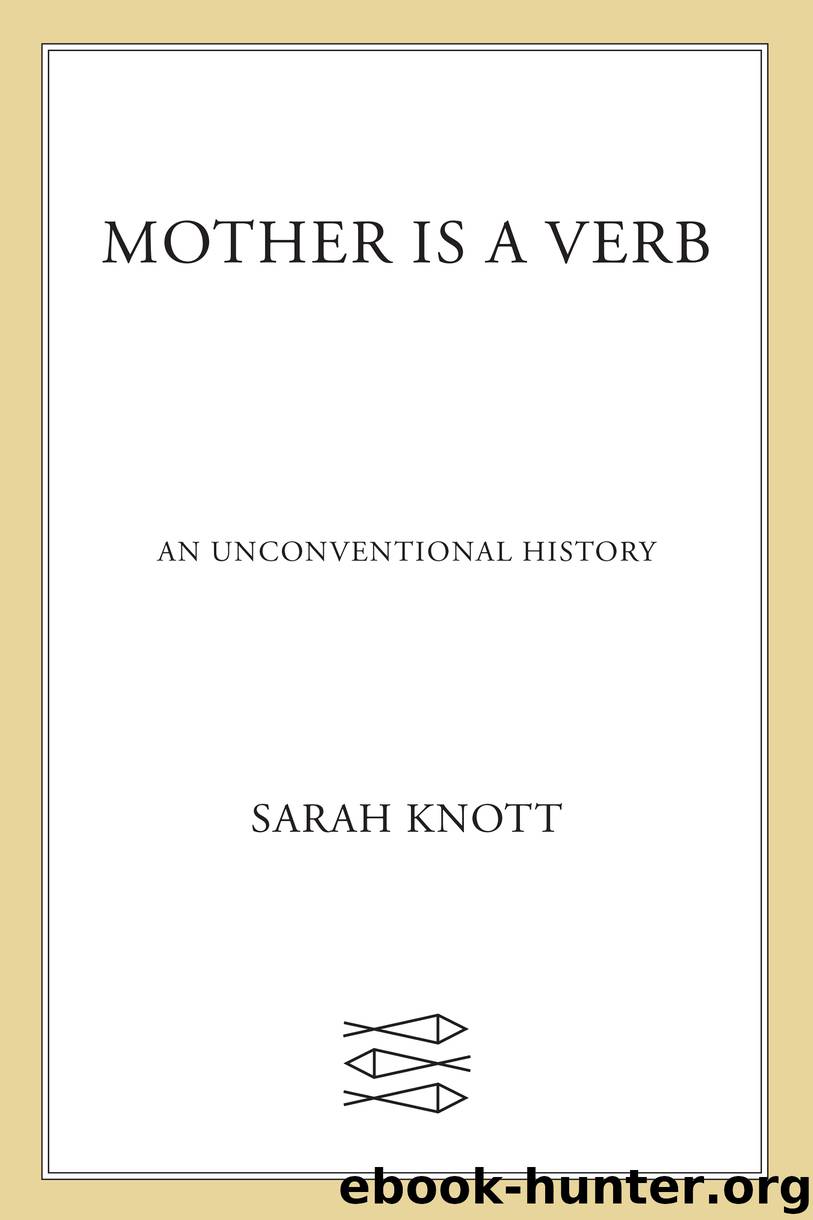Mother Is a Verb by Sarah Knott

Author:Sarah Knott
Language: eng
Format: epub
Publisher: Farrar, Straus and Giroux
* * *
I recount choice pointers from all this bookish advice-giving to the dark-haired woman, Sarah, liking her offhand calm and trading my historian’s know-how for her present-day insights. Maybe the babies are just old enough to be trusted not to wake in the early portion of their night, she suggests. Maybe we can slip out and meet halfway between our houses, take her dog out for a three-quarters-of-an-hour walk, taste a sliver of conversation, of our adult selves?
* * *
So much advice dispelled across the centuries. From slim seventeenth-century pickings to mass-market modern books, from paper made of linen and cotton to wood pulp, from medics and then from matrons, the volume of books and commentary is overwhelming. Dwell a little longer among the century-by-century shelves, and further historical patterns appear.
Whatever the century, the preeminent concern about infant care is nursing, feeding, weaning: about milk. Other routine topics are sleep and evacuations. All babies eat, sleep, and shit.
Other themes come and go. Themes that disappear: the dangers of colostrum, the merits of the cold bath, and innate infant depravity (still lingering in the 1930s). Themes that arrive: scheduling (especially from the late nineteenth century), tackling bacteria (with the valuable bacteriological insights of that same moment), and burping and winding (an apparent side effect of modern recommendations for solitary sleep, a baby being laid down flat and left alone). The merit of exposure to fresh air comes and goes and comes back.
Formal medicine has a constant voice across the centuries. Other fine-grained bodies of knowledge and disciplinary subfields—some directly related to medicine and some not—impose on the guides across time. The list across the shelves runs: midwifery, philosophy, phrenology, anatomy and physiology, psychology, pediatrics, eugenics, dietetics, behaviorism, psychoanalysis, anthropology, neuroscience. For a hundred years, phrenology studied the human mind from the assumption that different parts of the brain were correlated with different mental powers. Pediatrics emerged as a distinctive and steadfast branch of medicine in the mid-nineteenth century. Eugenics in the late nineteenth and early twentieth centuries studied how to produce fine offspring and men of supposed “high type” and later disappeared on being discredited as a racist pseudoscience. Behaviorism interpreted infant psychology from babies’ observable responses to their environment. Psychoanalysis offered new models of infant development and such concepts as neurosis or oral gratification.
Each of these disciplines asked different questions and tried out different answers. Eighteenth-century philosophy: If the mind is a blank slate, how should an infant be raised and educated? Nineteenth-century eugenics: What tendencies exist in the stock from which the baby comes, and how can the white master race be protected? Twentieth-century anthropology: What are the different infant-care practices of people like the!Kung of the Kalahari Desert or the Yequana of the Amazon, and how do they compare with Western modes of care? Often, both the discipline and the underlying questions exist between the lines. Only the answers—the telling a person “how to”—appear innocently in the text.
Metaphors for babies lapped up the times. In the late
Download
This site does not store any files on its server. We only index and link to content provided by other sites. Please contact the content providers to delete copyright contents if any and email us, we'll remove relevant links or contents immediately.
| Civilization & Culture | Expeditions & Discoveries |
| Jewish | Maritime History & Piracy |
| Religious | Slavery & Emancipation |
| Women in History |
Cecilia; Or, Memoirs of an Heiress — Volume 1 by Fanny Burney(31333)
Cecilia; Or, Memoirs of an Heiress — Volume 3 by Fanny Burney(30934)
Cecilia; Or, Memoirs of an Heiress — Volume 2 by Fanny Burney(30889)
The Secret History by Donna Tartt(16627)
Sapiens: A Brief History of Humankind by Yuval Noah Harari(13054)
Leonardo da Vinci by Walter Isaacson(11903)
The Radium Girls by Kate Moore(10907)
Sapiens by Yuval Noah Harari(4537)
The Wind in My Hair by Masih Alinejad(4424)
How Democracies Die by Steven Levitsky & Daniel Ziblatt(4399)
Homo Deus: A Brief History of Tomorrow by Yuval Noah Harari(4280)
Endurance: Shackleton's Incredible Voyage by Alfred Lansing(3845)
The Silk Roads by Peter Frankopan(3762)
Man's Search for Meaning by Viktor Frankl(3634)
Millionaire: The Philanderer, Gambler, and Duelist Who Invented Modern Finance by Janet Gleeson(3569)
The Rape of Nanking by Iris Chang(3516)
Hitler in Los Angeles by Steven J. Ross(3437)
The Motorcycle Diaries by Ernesto Che Guevara(3333)
Joan of Arc by Mary Gordon(3259)
